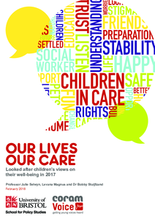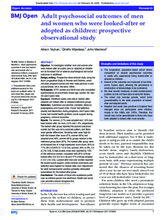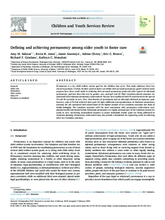Displaying 1311 - 1320 of 2221
This study analyzes semistructured interviews of 15 foster parents on how foster parents perceive the sibling relationships of youth in foster care and ways to promote these relationships.
The current study presents findings from a survey of child welfare caseworkers' experiences with reunifications and focuses on practices and key factors at the casework practice and at the system-environment level to assist in achieving successful reunification.
The current study reports the findings of a three-wave longitudinal study wherein the researchers examined the development of school engagement and analyzed which factors were predictive of school engagement in a sample of 363 Dutch foster children.
This report from the University of Bristol School for Poicy Studies and Coram Voice presents findings from a 2017 survey, in which 2,263 looked after children and young people from 16 local authorities in the United Kingdom completed the ‘Your Life, Your Care’ survey to determine their subjective, self-reported wellbeing.
This paper examines the longer term outcomes of young people who experienced out of home care (OHC) as children, in Britain, Germany and Finland, countries characterised by different welfare regimes.
This paper advocates for use of the life course perspective as a guiding research paradigm when investigating the educational experiences of adult care leavers.
Through this study, data were collected through interviews with 23 care leavers in Ghana to examine their challenges and the factors that influence their coping mechanisms.
This study examined the effects of placement and school stability on students' academic growth before, during, and after out-of-home placements.
The objective of this study was to investigate whether men and women who were looked-after (in public care) or adopted as children are at increased risk of adverse psychological and social outcomes in adulthood.
This study addresses three key research questions: (1) How do older youth in foster care define their personal permanency goals? (2) How much progress have these youth made in achieving their personal permanency goals and other aspects of relational permanency, and how does this vary by gender, race, and age? and (3) What transition-related outcomes are associated with relational permanency achievement?



